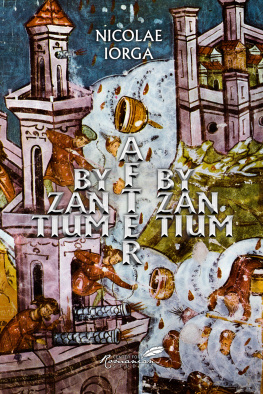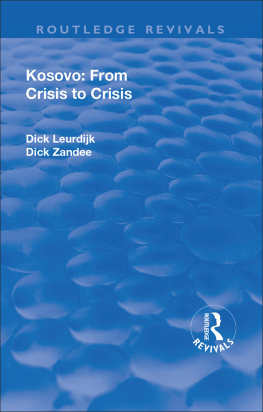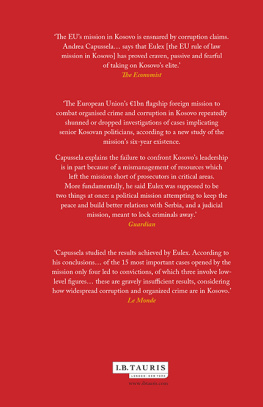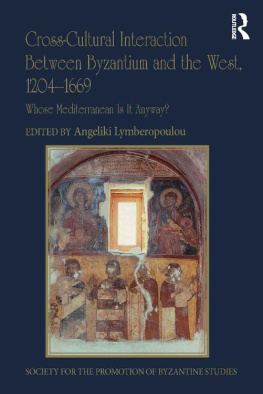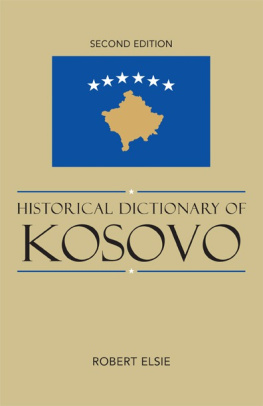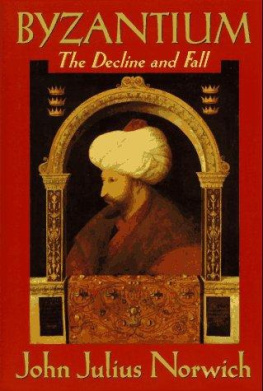Victoria Clark - Why Angels Fall: A Journey Through Orthodox Europe from Byzantium to Kosovo
Here you can read online Victoria Clark - Why Angels Fall: A Journey Through Orthodox Europe from Byzantium to Kosovo full text of the book (entire story) in english for free. Download pdf and epub, get meaning, cover and reviews about this ebook. year: 2011, publisher: Picador USA, genre: Religion. Description of the work, (preface) as well as reviews are available. Best literature library LitArk.com created for fans of good reading and offers a wide selection of genres:
Romance novel
Science fiction
Adventure
Detective
Science
History
Home and family
Prose
Art
Politics
Computer
Non-fiction
Religion
Business
Children
Humor
Choose a favorite category and find really read worthwhile books. Enjoy immersion in the world of imagination, feel the emotions of the characters or learn something new for yourself, make an fascinating discovery.
- Book:Why Angels Fall: A Journey Through Orthodox Europe from Byzantium to Kosovo
- Author:
- Publisher:Picador USA
- Genre:
- Year:2011
- Rating:3 / 5
- Favourites:Add to favourites
- Your mark:
- 60
- 1
- 2
- 3
- 4
- 5
Why Angels Fall: A Journey Through Orthodox Europe from Byzantium to Kosovo: summary, description and annotation
We offer to read an annotation, description, summary or preface (depends on what the author of the book "Why Angels Fall: A Journey Through Orthodox Europe from Byzantium to Kosovo" wrote himself). If you haven't found the necessary information about the book — write in the comments, we will try to find it.
Why Angels Fall: A Journey Through Orthodox Europe from Byzantium to Kosovo — read online for free the complete book (whole text) full work
Below is the text of the book, divided by pages. System saving the place of the last page read, allows you to conveniently read the book "Why Angels Fall: A Journey Through Orthodox Europe from Byzantium to Kosovo" online for free, without having to search again every time where you left off. Put a bookmark, and you can go to the page where you finished reading at any time.
Font size:
Interval:
Bookmark:

For my dear parents, without whom, etc...

LIST OF ILLUSTRATIONS
All photographs are copyright of the author unless otherwise stated.
ACKNOWLEDGEMENTS
The writing of this kind of book is entirely dependent on the help and goodwill of others.
My most heartfelt thanks go to the dozens of Orthodox Church people monks, nuns, priests, bishops, archbishops and the Ecumenical Patriarch who were generous with their time and hospitality and gracious enough to speak their minds to me.
Without the friends cum fixers cum interpreters cum protectors my travels would not have been nearly as interesting, safe or enjoyable. I dare say Goran Goci, Bogdan Zlati, Ljupo Spasovski, Viorel Hiran, Dan Ciachir, Vanya Kochkarev and Lena Vozdvizhenskaya did not suspect that agreeing to help me meant inclusion in the story. I am extremely grateful to all of them.
Journalist friends were unfailingly generous with contacts, book loans and accommodation. Particular thanks are due to Marcus Tanner, who first suggested exploring Romanias painted monasteries in 1986 and has shared my interest in Eastern Orthodox Europe ever since. To Bill MacPherson in Washington goes a big thank you for recommending that I abandon my newspaper job in London to write a book. Chris Stephen kindly put me up in Sarajevo, Helena Smith in Athens and Alison Mutler in Bucharest. Tim Judah and Marc Champion lent me books and contacts. Sophie Russell, Andrew Sparke and Elizabeth Randall read work in progress. Bruce Clark helped with foreign spellings. Natasha Fairweather, Richard Beeston, Broo Doherty, Anatol Lieven, Colin Smith, Kate de Pury, Tom de Waal and Justin Huggler all contributed.
Fathers Silhouan and Simeon at the Orthodox Monastery of St John the Baptist in Essex, Graham Speake of the Friends of Mount Athos Society, Greek Orthodox Bishop Kallistos Ware of Oxford, Dr Anthony Bryer of Birmingham University, Bishop Ambrose Baird of Fili near Athens, Father Christopher Hill in Moscow, the staff of the Cyprus Mail in Nicosia, John Nassis at the Ecumenical Patriarchate in Istanbul and Malcolm Walker at Keston College in Oxford were all very helpful.
Without the work of dozens of historians I would never have been able to write this book. None of them is responsible for any of the judgements, misjudgements and mistakes I have gone on to make.
Grateful thanks are also due to the Observer, the newspaper which sponsored my seven year sojourn in the Balkans and Russia between 1990 and 1996 and so helped prepare the ground for this book. Mark Frankland, Martin Huckerby, Adrian Hamilton and Ann Treneman took a special interest.
To my editors at Macmillan, Tanya Stobbs and Becky Lindsay, goes a big thank you for having the imagination and enthusiasm to back the project. Many thanks also to Nicky Hursell, who chased up photos so diligently. I also owe a huge debt of thanks to my agent, David Godwin, who first challenged me to define precisely what I found so engaging about Eastern Europe and then agreed that I should write about it.
A last but not least thank you goes to my parents and to my sister Nicola, for services ranging from listening to my Orthodox anecdotes, to painting the cover illustration, to correcting grammar and sharing a love of history.
FOREWORD
For my at best sketchy treatment of Bulgaria, Ukraine, Georgia, Belarus and Moldova in this survey of Eastern Orthodox Europe I offer profuse apologies, and plead lack of space.
My presentation of the former Yugoslav Republic of Macedonia and the northern Greek province of Macedonia in a single chapter makes useful historical rather than contemporary sense. It should not be interpreted as an argument in favour of revising national frontiers.

B YZANTIUM
Only an angel could have rejoiced at my first glimpse of the Holy Mountain through a fug of cigarette smoke and a rain-streaked porthole on a squally April morning. Imprisoned on a boat, peering up at the Byzantine monasteries clinging damply to their rocky fastness like outsize birds nests, I could not begin to appreciate the thousand-year-old stronghold of Eastern Orthodox spirituality in Europe.
A sudden blaze of Greek sunlight to transform the sea from base grey to silver, to glance off the monastery crosses and lift the mist from the summit of Mount Athos itself might have helped, but not much. A closer view would have been nice, but still second best, because access to those forty square kilometres of earthly paradise one of three crooked fingers of land dangling into the Aegean Sea off the south-eastern edge of Europe was essential if I was to achieve what I had set out to do.
Once on the Holy Mountain I would wander the ancient paths between those crumbling fortresses of Orthodoxy, breathing the smells of incense, woodsmoke, beeswax and old stone and listening to the monks voices echoing in the courtyards and churches. I would see how the worlds hectic quickstep can stop in a spot where generations of men have observed the same round of liturgies, saints days and church feasts for a thousand years. I would begin to imagine how Mount Athos two thousand or so monks have come to believe they are imitating Gods angels...
But what was the sense in dreaming? I would do none of these things for the simple reason that, for the past nine hundred years, the Holy Mountain has been out of bounds to all women. Any genderless angel, any monk, any male for that matter, could rush in where I was for ever forbidden to tread.
The ban on women setting foot on Athos was some elderly monks response to an outbreak of fornication on the peninsula at the close of the eleventh century. Saucy women, masquerading as The section of the rule relating to female animals has been relaxed, but to this day the monks of the Holy Mountain make one exception only where women are concerned, for the Mother of God. Shipwrecked on the Holy Mountain a few years after the death of her son, the Blessed Virgin Mary is said to have taken a special fancy to the place and claimed it as her own. Let this land be for ever mine given to me by my son and God, she is said to have said. The Garden of the Mother of God is how the monks still like to refer to their rocky stronghold.
Tradition was all very well and, of course, there was no competing with the Mother of God, but here was I at the start of the twenty-first century, a citizen of a secular European Union guaranteeing freedom of movement for all within its borders and equality of the sexes. Travelling in Greece, which is a member of that union, earnestly seeking a closer acquaintance with the world of Eastern Orthodox Christianity in Europe, I had found that a mere accident of gender barred me from examining its heart. Surely, I reasoned, it behoved me to storm this last bastion of masculinity in Europe? I would not have been the first to attempt it.
A hundred years after a fourteenth-century Serbian queen found refuge on Mount Athos from the ravages of the plague, the Virgin Mary startled a trespassing Eastern Orthodox sultana who was bound for a monastery bearing gifts of gold and frankincense. She commanded her to Come no further, for here is another queen than thou the Queen of Heaven.for the next four hundred years. However, a crowd of Greek refugees, fleeing the wrath of the Ottomans during the Greek War of Independence in the early nineteenth century, included a few women and thereafter the number of violations and attempted violations increased. An Edwardian adventuress in the company of two men put ashore one summer for a bit of a lark, and was kindly received by the monks. Shortly afterwards a Frenchwoman wrote a highly suspect account of a sojourn among the monks of Athos, made possible, she claimed, after she had sliced off her breasts. In the early 1930s a Swedish woman, dressed as a man and armed with her brothers passport, failed to gain admittance after collapsing in a fit of giveaway giggles as she was about to step ashore. More recently, a few Italian holidaymakers who, ignorant of their whereabouts, weighed anchor off the peninsula to sunbathe on the beach, were the reason for the formulation of a new rule. All boats carrying women must steer a course 500 metres from the shores of the Holy Mountain.
Next pageFont size:
Interval:
Bookmark:
Similar books «Why Angels Fall: A Journey Through Orthodox Europe from Byzantium to Kosovo»
Look at similar books to Why Angels Fall: A Journey Through Orthodox Europe from Byzantium to Kosovo. We have selected literature similar in name and meaning in the hope of providing readers with more options to find new, interesting, not yet read works.
Discussion, reviews of the book Why Angels Fall: A Journey Through Orthodox Europe from Byzantium to Kosovo and just readers' own opinions. Leave your comments, write what you think about the work, its meaning or the main characters. Specify what exactly you liked and what you didn't like, and why you think so.



